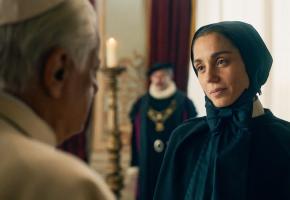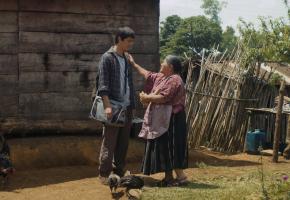‘Ordinary Time’ is a film of fiction with a definite documentary feel. It is probably true to say that documentaries as features have taken off in the last few years. Personally, it started for me with Leon Gast’s award-winning “When We Were Kings” (1996), the astounding documentary featuring the legendary 1974 boxing match between Mohammed Ali and George Forman. That film was supposed to be about a Soul Power music festival set in Kinshasa, Zaire, with James Brown, Miriam Makeba, Celia Cruz and B.B. King to mention a few, with a side show of a boxing fight that was not expected to be the heart & soul of the production. But it ended up very much the other way around. The power of the events that unfolded spoke for themselves. Master documentary film-maker Asif Kapandia (Maradona, Senna) pins it down by admitting: -
“There’s a misconception that documentaries are ‘somehow real’.”
The dilemma for the director is to be ‘honest and true’ to his material, while necessarily editing and moving scenes and images around so that they make sense, in some cases, to avoid being dull! The result is a form of manipulation. So, you could question whether there is such a thing as a genuine documentation of facts. The term ‘documentary’ was first used by a director called John Grierson. Apparently, he pinched it from the French who used it to mean a ‘travelogue’: i.e. : plain descriptions of natural material. So, elements are introduced to keep it “vital, illuminating, personal and refreshing, so that it is not just an encyclopaedic compilation of information, like an archive.”

Marta Lança with daughter Carlinha
This basic premise of ‘the documentary’ has evolved now into what could be called “True Fiction”, which has become an interesting development. These are films that are written and directed as fiction, but that are materially and emotionally linked to true events.

Susana Nobre
One such film is ORDINARY TIME (2018) by Portuguese director Susana Nobre, that deals with the simple and poetic documenting of the first year in the life of baby Carla, with her parents, extended family and friends. Through dialogue and interactions with others, the world of these new parents and their new-born child comes alive. No huge dramas take place, it is a contemplative and reflective film that pulls us into the experiences of this family, their friends and immediate environment.
Part of the reason that ‘true fiction’ works is that the director is able to inject elements that can emphasize and illuminate aspects of the images. For instance, poor unprofessional footage of racing driver 'Senna' was combined by Asif Kapandia with very high-quality sound effects that enhanced the visual experience and elevated it to a completely different level. This is part of the attraction of ‘true fiction’. The director has access to effects and elements, in particular sound, that can enhance the images on the screen and increase the depth of impact on the viewer.
Susana Nobre has used a charming musical track, ‘Les Ballets du Roi’, a gavotte played by Francisca Duarte, to great effect in this movie. Her gentle sense of humour and great capacity to observe, has allowed her actors to emerge as real people on screen. Although the film was scripted by Nobre, it feels totally natural and spontaneous.
Born in Portugal in 1974, Susana Nobre studied Communications at the New University of Lisbon in 1998. Her most interesting work emerged after she attended a film directing course organized by the Calouste Gulbenkian Foundation, where she worked on a creative and artistic programme of several short art films in collaboration with the London Film School. In 2008 she co-founded the film production company Terratreme (formerly known as Raiva).
Right from the start she was interested in working with real events, her first film was shot in a hospital. Susana Nobre: -
“All my early films were documentaries in the traditional sense, my first film ( 2003) was made in a public hospital in Lisbon, where I stayed three months shooting a ‘daily’ diary… documenting the ‘every day’ activities of people in consultations with doctors, listening to what was being said about their illness. And so… the purest traditional sense of making a documentary is observing the way a person is in front of a camera… you observe and receive a lot. Now, I continue to work with biographical elements, but at the same time, I also write a script on how to put things together. The original idea behind ‘Tempo Común’ was autobiographical. At the beginning I thought about the film in a more minimal way. I was at home with my daughter. She was born in February, when the weather was not so good to walk outside, so we spent a lot of time at home… receiving a lot of family visits and from friends … there were always people around when I was breastfeeding my daughter, people would sit with me and talk about their lives. So, I started to think it would be interesting to make a film in that minimal sense, breastfeeding while people around you talk about their lives. Do you know the Abbas Kiarostami’s film TEN? A woman driving a taxi and receiving passengers and conversing with them? Instead of a taxi, I used my bedroom… when I started to write, [I found] that other elements emerged, so it has been interesting … I started writing dialogues and working the texts [which was new to me].”

Marta Lança
Based on her own experience of the birth of her daughter, getting the right cast was a problem. Fortunately, the actress, Marta Lança is a friend who was also, happily, pregnant! Carla (Carla Castanheira) is her real-life daughter and Pedro (Pedro Castanheira) her real – life husband. A lot of time and space is needed to work so closely, so Nobres had to adapt so as not to interfere too much:
“… They were the only persons I knew who would agree to receive our film team into their most intimate moments with their child.”
Outside versus inside is noticeable, especially when they visit a friend in the countryside emphasizing the contrast of the urban environment to the countryside and the different ways people live.
“[The old lady] was really a neighbour of Marta’s. She is almost blind and loves repeating stories about people that lived there in the past and [in particular] her own mother, so I just placed the camera with them and I let her talk… and talk she did!”
This magnificent elderly neighbour talks about her own childhood experiences and how things were perceived in other times, “… they would have 11 or 12 children and never saw a doctor…they would suffer so much and led miserable lives!” she states emphatically.
Susana Nobres expresses a fascination with life and the enthusiasm for recording it and documenting it in all manners and techniques. She clearly enjoys and savours the idiosyncrasies and rhythms of normal everyday life, parenthood, extended family and the circle of close friends and what they can contribute. This is a study of ‘family’ from many perspectives, outer and inner evolutions. Nobres admits that she would have liked to film herself instead of an actor: -
“The idea fascinates me, so I would have liked to be in her place, yes… if I have a second child… then maybe I will do that!”
The title of the film ‘Ordinary Time’ (Tempo Común) however, does not refer to any mundane or common elements in the usual sense, but to the ‘order’ of periods in the Catholic calendar between the so-called highlights, be it the feasting at Easter & Christmas, or the penance of Lent or Advent. These ‘ordinary' times’ are anything but unimportant or uninteresting. They are times for contemplation and watchfulness and this film definitely reflects these elements of life.
The film premiered in the UK at the BFI London Film Festival 2018 and now has been screened in June 2019 at the ICA with a Q&A. Not one to be sitting around, Nobres is already working on her next production which also studies a significant period in a persons’ life, in this case a man who is reaching the end of his working life: -
“[It is] about a man who is more or less unemployed and he knows that he must keep working [ while he can] because he will soon be retired, and [bidding] a farewell to his working life. He was a taxi driver… in New York during the 1970s and 1980s and there are flashbacks to his life in America- we are working on it now, [there is] a bridge between the two places built up from his own memories. I will analyse all the elements as they come together, then, at the point of editing, we will discover the real feeling!”
ORDINARY TIME (2018) is being screened at the ICA June 26th and June 27th and will play at selected cinemas throughout the UK throughout July & August 2019.
Director/ Writer Susana Nobre
DOP Paulo Menezes
Editor João Rosas
Production Terratreme Films
Cast:
Marta Lança
Carla Castanheira
Pedro Castanheira
Nominations: Best Film: Rome Independent Film Festival/ Indie Lisboa International Film Festival, Rotterdam International Film Festival



















